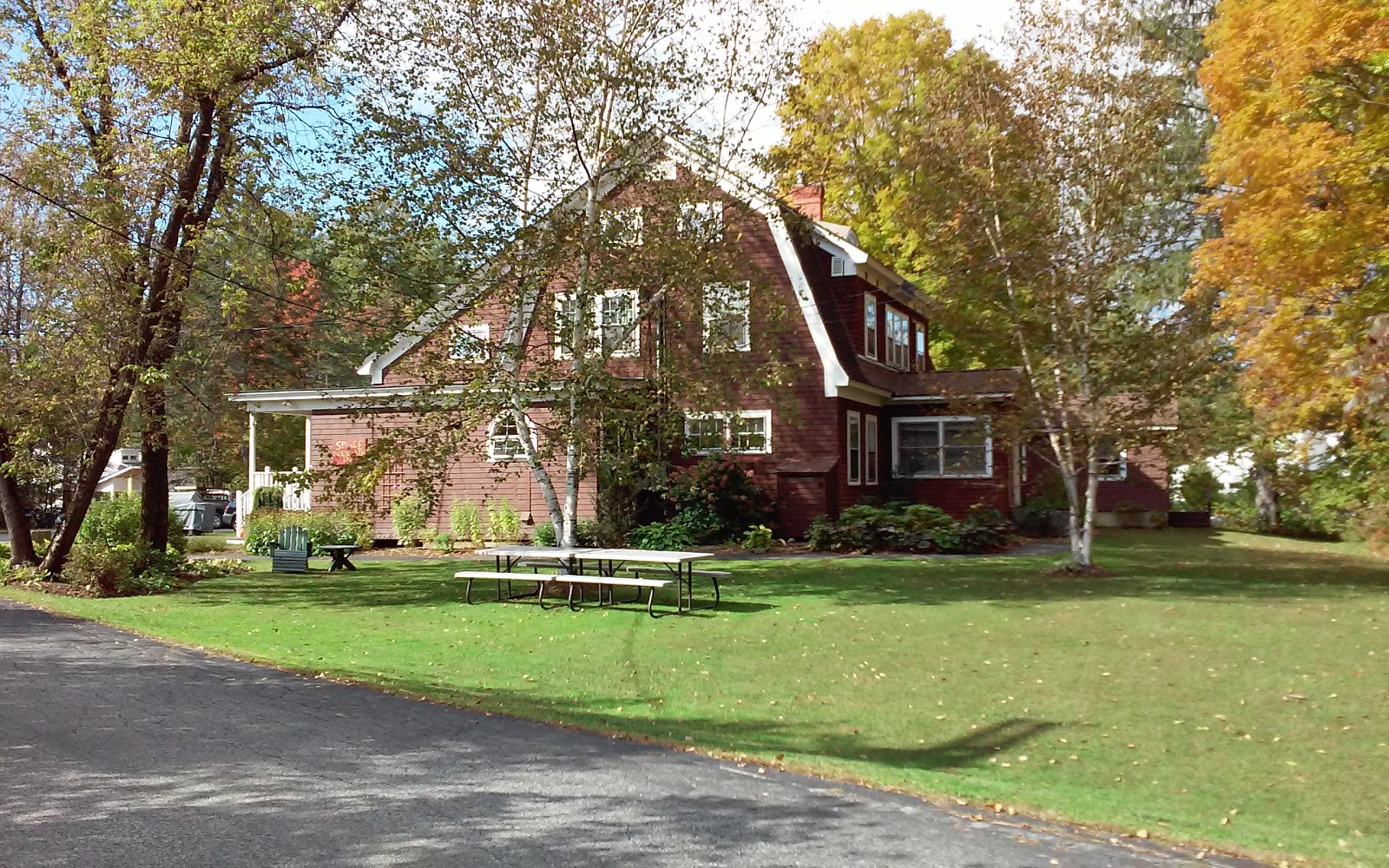Spruce Mountain Inn


Overview
Spruce Mountain Inn is an substance abuse treatment center that provides inpatient detoxification, for men and women from 18+ years of age. As part of their special programs, Spruce Mountain Inn treats clients with hiv or aids, persons with eating disorders, and clients who have experienced trauma. To help patients achieve sobriety, Spruce Mountain Inn provides intake assessments. Afterward, patients receive 12-step facilitation, individual psychotherapy, and cognitive behavioral therapy during treatment. Spruce Mountain Inn is located in Plainfield, Vermont, providing treatment for people in Washington County, accepting cash or self-payment and daily.
Spruce Mountain Inn at a Glance
Payment Options
- Cash or self-payment
- Daily
Assessments
- Comprehensive mental health assessment
- Comprehensive substance use assessment
Age Groups
- Young adults
Operation
- Private for-profit organization
Treatment At Spruce Mountain Inn

Conditions Treated
Mental health treatment:
Mental health treatment provides a safe and structured environment where individuals can receive professional care and support for their mental health challenges. Within the facility, trained therapists, counselors, and medical staff work together to create personalized treatment plans tailored to each person's needs. Patients might participate in a variety of therapies, including individual counseling, group therapy, and possibly medication management. The goal is to equip individuals with the tools and strategies they need to cope with their conditions and lead fulfilling lives.
Alcoholism:
Alcohol addiction is when a person becomes physically and mentally dependent on alcohol, leading to mood swings, impulsive actions, intense cravings, and withdrawal symptoms. Treatment includes supervised detox, therapy, and support groups. It's important to note that rehabilitation doesn't "cure" alcoholism, but it helps individuals better manage their addiction, regain their ability to function in daily life, and improve their overall well-being.
Substance use treatment:
Substance abuse treatment programs can help to address addiction and, if relevant, any co-occurring mental health conditions. Programs include outpatient, inpatient, dual-diagnosis, and partial hospitalization. The addict will receive therapies like cognitive behavioral therapy, or dialectical behavioral therapy, and sometimes complementary therapies like acupuncture and mindfulness-based therapy. By attending skills training and recovery groups you’ll build a strong foundation for your recovery and strengthen your support network, increasing your chances of long-term recovery success.
Co-occurring Disorders:
Dual-diagnosis rehabs are usually the appropriate solution to treat co-occurring mental health and substance abuse disorders. These facilities typically employ medical and behavioral experts who use a range of interventions, together with the right healing environment, for you to achieve and sustain long-term recovery. Treatment usually includes evidence-based therapies (like cognitive behavioral therapy), recovery support meetings, 12-step facilitation, psychoeducation, skills training, and group therapy.

Levels Of Care
Detoxification:
Detoxification, often called detox, is like a reset button for the body after someone has been using drugs or alcohol. Its main job is to help people who want to quit these substances by easing the discomfort they might feel when they stop. Think of it as a way to clean out the harmful stuff in the body when someone has been using drugs or alcohol too much. Detoxification aims to make the process of quitting safer and less painful for the person.
Halfway house:
A sober living home is a residential facility designed to support those recovering from substance abuse. Unlike inpatient rehab centers, it doesn't offer constant medical supervision but emphasizes a drug-free lifestyle. Residents adhere to set rules, such as curfews and mandatory group meetings and are often subject to random drug tests. The environment balances independence with accountability, helping residents reintegrate into society, build coping skills, and maintain sobriety while surrounded by peers who share similar recovery challenges.
Hospital inpatient treatment:
Inpatient treatment includes an all-encompassing residential therapeutic regimen, during which patients reside on-site for a period usually spanning 30 to 90 days. Within this immersive setting, individuals receive structured assistance, prioritizing their safety and fostering a dedication to recovery. The treatment modalities offered may include individual and group counseling, cognitive-behavioral therapy, holistic interventions, family therapy sessions, as well as experiential therapies. The overarching objective is to comprehensively address the physical, emotional, and psychological dimensions of addiction or mental health disorders, establishing a resilient groundwork for long-term healing.

Treatment Modalities
12-step facilitation:
12-Step Facilitation is a structured approach to recovery used in many rehab facilities. It's rooted in the principles and practices of Alcoholics Anonymous (AA) and its 12-step program. The facilitation process promotes abstinence and supports individuals in becoming actively involved in 12-step self-help groups. The approach emphasizes personal responsibility, spiritual growth, and the importance of peer support to maintain sobriety and prevent relapse. By guiding individuals through each step, 12-step Facilitation aids participants in understanding the underlying causes of their addiction, seeking amends, and fostering a commitment to lifelong recovery.
Individual psychotherapy:
Individual therapy is a one-on-one therapeutic interaction between a therapist and a client to address personal challenges, foster self-awareness, and promote mental, emotional, and behavioral growth. This setting provides a confidential and supportive environment for individuals to explore their thoughts, feelings, and behaviors, identify goals, and develop coping strategies. Individual therapy can be beneficial for a range of concerns, including anxiety, depression, stress management, relationship issues, and life transitions.
Cognitive Behavioral Therapy:
Cognitive Behavioral Therapy (CBT) is a form of psychotherapy that emphasizes the critical role of thinking in how we feel and what we do. It aims to identify and challenge distorted or negative thought patterns and behaviors, teaching individuals to replace them with more constructive and rational beliefs. CBT is evidence-based and has been shown to be effective in treating a variety of psychological disorders, including depression, anxiety, and phobias, among others.
Dialectical Behavior Therapy:
Dialectical Behavior Therapy (DBT) is a cognitive-behavioral approach specifically designed to help individuals regulate emotions, enhance interpersonal effectiveness, develop distress tolerance, and increase mindfulness. In addiction treatment, DBT equips individuals with practical skills to manage triggers, cope with stressors, and build a life worth living without resorting to substance use. By addressing both the emotional and behavioral challenges of addiction, DBT fosters personal growth and long-term recovery.
Eating Disorder Treatment:
Eating Disorder Treatment" is a specialized approach to help individuals with disorders like anorexia and bulimia. It combines medical, psychological, and nutritional interventions to address these conditions' physical and emotional aspects. The goal is to support recovery, promote self-acceptance, and improve overall well-being.
Nicotine replacement:
Nicotine Replacement Therapy (NRT) is a medically-approved approach designed to help individuals quit smoking by providing a controlled dose of nicotine without the harmful chemicals found in cigarettes. Available in various forms, such as patches, gums, lozenges, and inhalers, NRT reduces withdrawal symptoms and cravings, making the transition to a smoke-free life more manageable.
Group counseling:
Group Therapy is a therapeutic space where individuals battling addiction come together to share experiences, gain insights, and support one another on their journey to recovery. Facilitated by trained professionals, this setting fosters communal healing and empowers participants to overcome the challenges of addiction through collective strength and understanding.
Experiential Therapy:
Experiential Therapy is a therapeutic approach that encourages individuals to identify and address hidden or subconscious issues through activities, actions, and direct experiences. Unlike traditional talk therapy, this method involves engaging in activities, role-playing, and other interactive techniques to garner emotional expression and self-discovery. By placing individuals in relevant situations, therapists can observe their behaviors and emotions in real-time, allowing for immediate feedback and insight. Through this interactive process, individuals can better understand their feelings and behaviors, develop coping mechanisms, and work towards resolving personal conflicts.
Nutrition Therapy:
Nutrition therapy, often referred to as medical nutrition therapy (MNT), harnesses the power of diet to address physical, emotional, and medical challenges. Expert nutritionists or registered dietitians craft specialized dietary strategies for individuals, guiding them to enhance both their physical and psychological well-being through food choices.
Trauma-related counseling:
Trauma therapy delves into past traumatic events that might be influencing a client's current life experiences. Often, trauma serves as a significant precipitant or underlying cause of addiction. Such traumas can arise from childhood sexual abuse, domestic violence, growing up with a mentally ill parent, early parental loss, and experiences of sexual assault in teen or adult years, among other circumstances. Trauma therapy aims to aid the individual in processing and navigating beyond these traumas, guided by the expertise and empathy of skilled mental health specialists.
Family counseling:
Studies consistently show that the likelihood of sustainable recovery increases when family members are involved in rehab and substance abuse treatment. Genetic elements might influence susceptibility to drug and alcohol dependence and mental health challenges. Family interactions frequently contribute to addiction triggers. However, with the right education, family members can become pivotal support pillars during rehabilitation.
Life Skills:
Life skills refer to a vital component of rehabilitation that focuses on equipping individuals with the essential abilities and strategies necessary to lead a fulfilling and substance-free life. These skills encompass a wide range of practical tools, such as effective communication, problem-solving, stress management, time management, and financial literacy. By integrating life skills training into addiction treatment programs, individuals gain the confidence and competence needed to overcome addiction and thrive in their personal and social lives, promoting long-term recovery and well-being.
Creative Arts Therapy:
Creative Arts Therapy is a therapeutic technique that harnesses the power of the arts— including visual arts, dance, music, and drama—to help individuals express themselves, explore their emotions, and improve their mental, emotional, and even physical well-being. Through engaging in the creative process under the guidance of a trained therapist, individuals can uncover and work through underlying issues, improve self-awareness, and develop coping skills in a safe and supportive environment. This form of therapy is used to treat a variety of mental health conditions and is beneficial for people of all ages.
Holistic Treatment:
Holistic treatment in a rehab center encompasses a comprehensive approach to recovery, addressing an individual's physical, emotional, mental, and spiritual needs. Rather than focusing solely on the symptoms of addiction, this method seeks to treat the underlying causes and imbalances that contribute to substance abuse. Incorporating a variety of therapies, such as meditation, yoga, acupuncture, and nutritional counseling, holistic treatment aims to heal the whole person, ensuring a well-rounded and sustainable recovery journey.
Ancillary Services
Special Programs
- Clients with HIV or AIDS
- Persons with eating disorders
- Clients who have experienced trauma
Contact Information
DISCLAIMER: The facility name, logo and brand are the property and registered trademarks of Spruce Mountain Inn, and are being used for identification and informational purposes only. Use of these names, logos and brands shall not imply endorsement. BetterAddictionCare.com is not affiliated with or sponsored by Spruce Mountain Inn.

